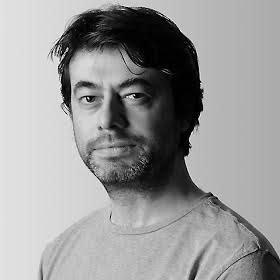Blur drummer Dave Rowntree: “Some dads and sons would go to the football. We'd sit around the kitchen table with soldering irons, building radios”
The omni-talented, multi-faceted sticksman takes on going solo, drumming, flying, building his own studio gear - and bagpipes
Although best known for his work behind the drum kit with Blur, Dave Rowntree is anything but your average beat maker. Between the band’s break and next year’s Wembley-filling return, rather than resting on a sky-high pile of laurels, Rowntree has been living an exciting, creative and musically arresting second life behind the Britpop monster’s back.
The famous line is that you have to get to 10,000 hours of practice or you’re not doing it properly. I did at least that in the first week of playing the drums
His first solo album, Radio Songs, is out on 20 January. An introspective, heavily electronic look back to his formative years that shines a light on the inner workings of the creative process and the complexities of a man whose politics, skills with a soldering iron and soundtrack writing credits deserve attention. And whose talent with the bagpipes may never fully be realised.
We caught up with him at his home studio in Surrey, during downtime in preparation for his first solo tour and his first time out at both the cutting- and actual edge of a stage.
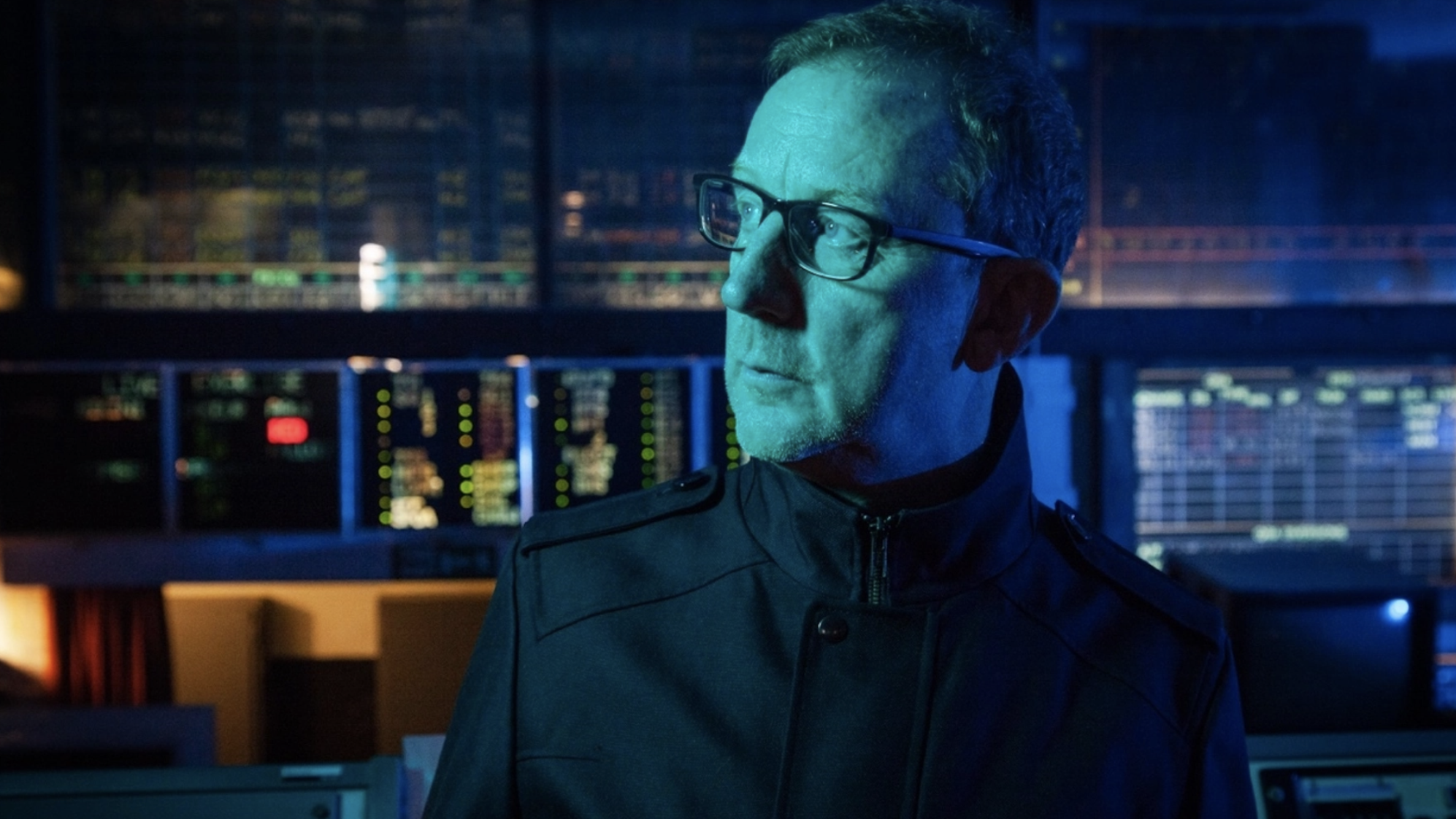
I fell in love with bagpipes. And I’d listen to a lot of bagpipe music. It's an instrument that I find startling to this day
What's it like being the frontman? Is it a long journey, stepping out from the back?
"It was surprisingly natural, actually. It turned out that all of those years, working on stages have kind of prepared me in a way that I hadn't really imagined.
"I've done a lot of public speaking as well as various other roles that I've gotten in my private life. And I’ve done backing vocals with Blur for many years so, singing… I wasn't completely starting completely from scratch.
"Though I did take singing lessons to make sure. Because you've got to be able to rely on your instrument, haven't you? I thought that might be a problem, if I start doing longer tours."
Want all the hottest music and gear news, reviews, deals, features and more, direct to your inbox? Sign up here.
Is that the first time you've taken lessons? Teach you anything that you didn't know?
"Oh, yeah, it was great. Absolutely. I definitely learned a lot. These things are all about technique, aren't they? You can try and ‘brute force’ it and figure out how to do it the hard way. Or you can just have somebody tell you in exchange for money. It's the simple way to do things."
These things are all about technique, aren't they? You can try and ‘brute force’ it and figure out how to do it the hard way. Or you can just have somebody tell you in exchange for money
Never too late to learn something new.
"You know, I've kind of kicked myself really. I didn't try very hard at school, I took it all very much for granted. They were desperate to teach me and they'd have loved nothing more than if I'd have just sat up and taken notice of their lessons. I kind of kick myself now that I didn’t take that more seriously."
Did you start playing the drums at school? Your first instrument?
"Well, I'm a failed piano player. Both my parents were classical musicians. My mother was a violinist. My dad was a singer. And so they insisted, from the age that I was big enough to sit on a piano stool and reach the keys, that I have piano lessons. And because I was forced into doing it, I absolutely hated piano with a vengeance!
"I was a kind of proto-lawyer I think even then, and so I thought, well, if I can enter into a negotiation, and get that rule changed to ‘you have to have musical instrument lessons’ then I could pick the most obnoxious instrument and they’d let me go out and play football with my mates. So I picked the bagpipes. Which is well known as the most noxious instrument known to man."
So it wasn't just an idle threat? You actually followed through with it?
"I fell in love with bagpipes. And I’d listen to a lot of bagpipe music. It's an instrument that I find startling to this very day. But you need an adult's body to play the bagpipes. It’s a very, very physical instrument and I was a young kid."
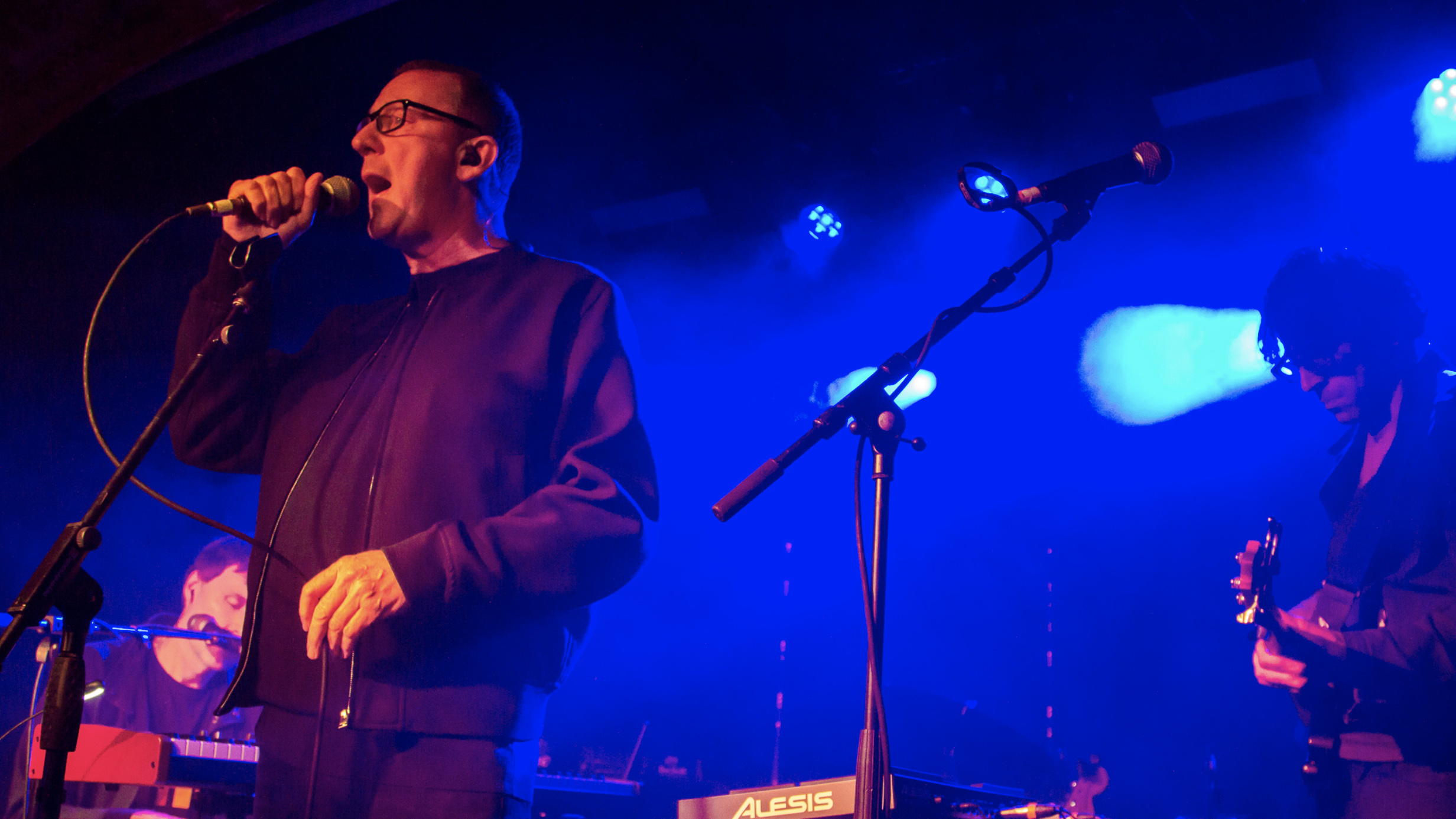
I discovered girls and pop music and the kind of extraordinary power that one had over the other. And that was that
I’m imagining it’s a tricky thing to pick up.
"Well, there were some of the best bagpipe teachers in the world in Colchester, where I lived, because the Black Watch, the famous Scottish band, were there. So, I was taught by a world class tutor. Well… I attempted to be taught by a world class bagpipe tutor… But he basically said “Come back in five years because you need an adult's lungs”. It's an adult's instrument. A fighting, shagging kind of instrument. Not for a puny eight year old."
And the drums came after?
"So the second most obnoxious instrument is the drums. So I segued seamlessly onto the drums. But instead of what I thought was going to happen, in fact, I got utterly obsessed by the drums. To the point where I gave up football altogether and would run home from school so that I could spend the rest of the night playing the drums.
"I think everybody has it. Everyone has either football or music. You can't do both. You’ve got to swing one way. I think that both take a lifetime of practice to get any good. If you spend half a lifetime at it then you're useless at both. The famous line is that you have to get to 10,000 hours of practice or you’re not doing it properly. I did at least that in the first week of playing the drums.
"I was absolutely inseparable to quite an unhealthy degree really. I would actually find it difficult to cope with not being able to play the drums."
So what kind of bands were you into? Did you have a band that you really wanted to emulate?
"No, I just wanted to play. I wanted to perform. My parents managed to get rid of me at the weekends by finding this local music school that ran music lessons at the weekend. So I did normal school Monday to Friday and music school on the weekends.
"So I fell in love with brass bands early on as well and played in the brass band for about probably 10 years. I just love performing. I would play anything. I became a great sight reader, you could just stick some music in front of me and I would play it."
So I've always built gear that I've worked with. I built my first synthesiser from a kit. I've been an electronics tinkerer ever since really
So pop and rock came later?
I love jazz. Jazz and orchestral music were my early loves. So my plan A, when I was still a young teenager, was to become an orchestral percussionist. That really is the best job in the orchestra. Better than being the conductor.
"You're a kind of paid member of your audience. You sit at the back surrounded by all these amazing players. You're next to the basses, which is the best place in an orchestra. And that's where you get all of the real kind of grit. And every 100 bars or so you go “clash!” and then you’re sitting back, smoking. So that was plan A and I was playing a lot of jazz in my free time. But later, in my teens, I discovered girls and pop music and the kind of extraordinary power that one had over the other. And that was that really."
So what was your big break? When did you start thinking ‘I could do this professionally?’
"It never occurred to me that I couldn't do it professionally. Really. That always seemed the obvious thing to do. It was one of those weird things in life where I was kind of ‘good’ straight away. You know?
"It didn't feel like it was a struggle. And I think that's a byproduct of the obsessive nature with which I was approaching it. I was playing the drums all the time. You know, all drummers tap incessantly? I know just how annoying it is, but even when I was doing something else, I’d still really be playing the drums."
Did your parents welcome another musician in the house?
"My parents were both quite badly burned by the classical music industry. My mum was a young blonde woman in the 1960s, which was a kind of dodgy place to be. The classical music industry was one of the most dreadfully misogynist environments to work in.
"Both of them said “Whatever you do, don't do it for a living. If you do it as a living you'll fall out of love with it, but if you keep it as a hobby you can love it forever.” And of course I completely ignored them. But I trained for a career in the other thing that I loved, which is electronics and computers."
So throughout your whole career as a drummer, there's always been an electronic studio side in the background too?
"Yeah, when my Dad did his national service he was a radio technician in the RAF. When they teach pilots, part of their pilot course is to teach them about their radios. So he could build radios from scratch and that's what we used to do. Some Dads and sons would go to the football, you know? He and I would sit around the kitchen table with soldering irons, building radios.
"We had a long wire out in the backyard, and we would plug it into the antenna, plug the other end into the earth socket in the wall and spin the dial and tune into all these stations from around the world.
"He taught me about how electronics worked and how you could design things like that. That's something that stayed with me really. So I've always built gear that I've worked with. I built my first synthesiser from a kit. I've been an electronics tinkerer ever since really. And then electronics was overtaken as a hobby in the 80s by computers.
"You had to build your first computers with a soldering iron on the dining room table. I used to write for a magazine called Dragon User – The Dragon 32. That was the computer I settled on."
What was that first synthesiser you built?
"Yeah, I was trying to remember the other day what it was. Like an idiot I sold it later on. Took me weeks to build! It was monophonic, obviously. It just had an oscillator and the envelope and a filter.
"It was all switched rather than patched. I never got it working 100%. If you build it yourself, you always know that it could be just a little bit better. You're never quite satisfied."
How’s your studio today? Is that full of home-made stuff?
"I’ve packed up most of my studio now because I needed to rehearse for some live shows. You know DIYRE? They make kits of really beautiful-sounding gear. These Colour Palettes are really nice. They all have some kind of distortion or tonal shaping function. It’s a rack mount thing that you can slot a number of these boards into. There are loads and loads of different bits of gear.
"This, this blue one is extraordinary. It's a little JFT amplifier overdriving amplifier and I’ve used it all over my album. You can just put synth sounds in or almost anything, and it adds a kind of indescribable quality to them. Sort of otherworldly quality, I don't know how it does it.
"But there's literally hundreds of these Colour Palette boards. You can buy some that you assemble or some arrive pre-made. So I fell in love with that. It's a hobby in itself really."
I'm getting the sense that you're far more into the kind of the physical aspect of studio gear rather than a DAW full of plugins?
Yeah, there’s something more visceral, I think, about having the actual gear. The Universal Audio plugins are pretty good. Some of them are, I think, as good as the real gear. But there’s something about grabbing a knob and turning it to interact with things that’s completely different to using a mouse and doing it on screen. You know?
"You can use both your hands, you can switch around, you can experiment. I'm all about playing this stuff like an instrument, that's my thing. Whenever I've got a piece of gear, I try to play in the same way that I play an instrument. That's how you get musicality out of it. And to do that you need some kind of interface that kind of makes sense to manipulate in a musical way. And a mouse just isn't that."
What's your go-to instrument for writing?
"I've got this keyboard which is the Native Instruments Komplete Kontrol. And I use Logic. I bang this into Logic to try and be inspired. It's just a controller but it’s got all these knobs on so you map things to these knobs and suddenly you can play things like it’s an instrument again and I'm back in my comfort zone."
And as far as hardware synths goes?
"I’ve not got a big collection but it’s an evolving collection. I've just finished doing two TV shows and the staple for that is the Moog One. I did The Capture for the BBC and War of the Worlds for Disney+ and the Moog is the most filmic-sounding synth. You could do almost any sound out there with that. It’ll work in almost any pro film or TV programme.
"The little Waldorf M, which I got fairly recently, is far better for those ticky, scratchy sounds. It’s quite interesting. The Moog Sub 25 I use for bass. You can't get any better than that for bass sounds. It’s only got one sound, but it's so good, you know?
"And then there’s the Sequential Prophet Rev Two. You'll see I don't have any vintage synths, I've just got remakes of vintage since I just got rid of all. It just cost too much money to keep them running.
"And then the DeepMind 12, which I use for string sounds. It does the best string sounds but it does loads of other things as well. And I've written a score just on that. It’s versatile but the string sound it's got is absolutely amazing. Then I've got a whole bunch of modular gear."
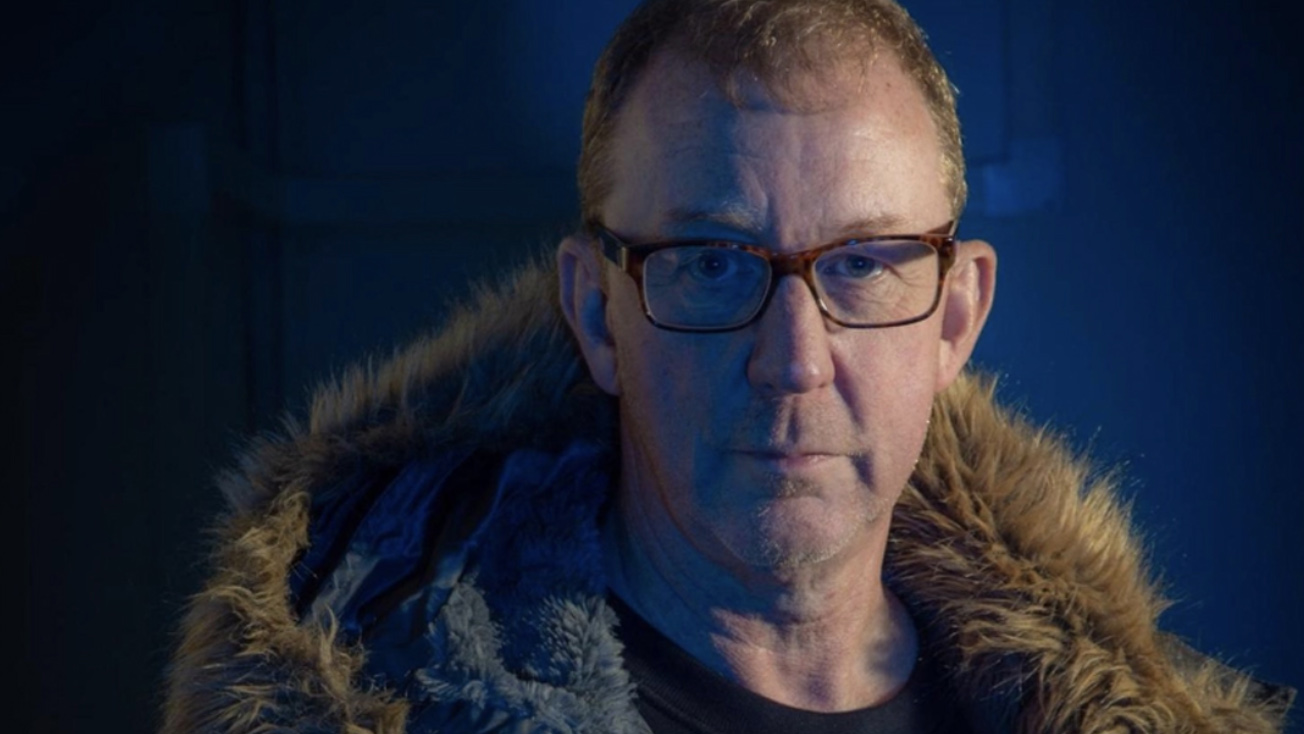
Are you a Eurorack fan?
"Well, am I a fan?… It’s a lot of fun to tinker with but often it's not particularly creative. What I’ve ended up doing is modularizing my modular gear into synths. So I've got these two Radical Technologies that are used together a lot – this oscillator here and an envelope there and an ADSR box there and MIDI. So I'll have that as a standalone synth.
"So if I get a nice sound going with that I just leave it because the problem with Eurorack gear is that once you pull out all the plugs or turn the knobs you’ll never find that sound again! If I just leave it then I know I've got the sound for the duration of the project.
"I'm just getting on top of my modular gear now, just getting it into some sort of usable state. That's the problem with doing commercial work. You need to be able to fix stuff, you need to be able to come back later. Especially with TV shows, you know? If the director doesn’t like it you’ve got to be able to do it again. It doesn’t matter if you think that it’s the most brilliant sound that's ever been found, if it's not the director's vision then it’s a do-over."
How did you get into soundtracks? It’s a notoriously difficult gig to get into? If you can prove yourself you’ve made it but getting your foot in the door…
"Yeah, you’ve got to have a big break really. Mine was the Bros film. I did that with a friend of mine. The film was released without comment, it didn't really make much of an impact.
"But then, 18 months later, it was shown over Christmas in one of those TV slots that everybody was watching and suddenly it became this massive, great thing. Everybody was talking. “Did you see that Bros film!” and suddenly the phone started ringing. But yeah, getting a big break is difficult, because there's lots and lots of very talented people who want to work."
And what was the brief like for that? It was quite a dramatic film at times.
"Yeah, the brothers' relationship… Five minutes into the film it completely disintegrated and they’d booked a show at the O2 in two weeks! So they had to rehearse for it. So it wasn't a horror film, but it needed to be able to illustrate that sort of emotion while still being relatively light hearted in other places. So it was, it's quite a difficult line."
You could have played it for laughs as far as a soundtrack goes…
"But you can't play it for laughs in film. You have to play it straight. It's the audience that has to imagine that joke. You can't just tell them the punch line. While it was kind of an oddball film and it was very funny, obviously, it's tragic in places. The story of two people who are very eccentric because of the damage that’s been done to them in the music industry. Far too big, far too soon, and then crashed down back down to earth."
Talking about music… It’s impossible. Even within Blur – and those are the best musicians that we’ve each ever met – we find it difficult to describe in words what we're trying to achieve
As far as delivering what a director needs, is there a consistent form that that brief takes?
"No, everyone's different. And it's generally – though not always – the bit of filmmaking they understand the least. So conversations can be quite difficult. They know what they want, but they don't know how to get there. So they don't know how to explain it to you. Talking about music… It’s impossible. Even within Blur – and those are the best musicians that we’ve each ever met – we find it difficult to describe in words what we're trying to achieve, or what we'd like somebody else to try and achieve. It's a very difficult thing to do. There's a lot of back and forth."
Do you present something and say ‘Like this?’ and they'll either love it or hate it?
"Yeah, so that's why the main skill in film music TV music is to be able to churn out a lot of music quickly, because almost inevitably your first draft is going to be completely wrong. They're gonna go “Oh, I see! Oh, you meant… Ah, no, no, no, not that.” And that’s two weeks… gone. You’ve got to be able to churn out the same amount again in the next two weeks.
"To some extent you can temp it with other people’s music to illustrate and give you something to talk about, and they can say “I like this… But I don’t like that.” Sometimes you get a project with no music in at all. The director isn’t even sure if there’s music or where it’s going to go.
What is it that you bring to it? What is it that they expect from you? Electronics? Orchestra?
"It’s usually a combination of the two. Hybrid scores. I write with string libraries but I like to use real players wherever possible. The dream is always to record with an orchestra because it’s amazing. It can be difficult to persuade the project of the benefits of doing that because the libraries sound – at first blush – very similar to the real instruments. It’s not until you play them the final score with the actual orchestra that they go “Oh, I see!” The libraries sound too good these days! Back in the old days when the string synths sounded crap…"
So as far as the new album goes, is this ‘years in the making’? Are these tracks that you’ve finished and placed on a shelf?
"Some of them, yeah. But mostly they were written the year before lockdown. It was lockdown that spurred it on. I was quite happy doing my film and TV shows then lockdown happened and all of that dried up. I was sat in this very room twiddling my thumbs wondering what I was going to do next.
"And Leo Abrahams, the producer, was in a similar position. He was in London and I was in Surrey. We’d planned to work together at some point but then lockdown came and I thought ‘Well that’s not going to happen’. But I said “Let’s just do some preparatory work. Knock these songs into some kind of shape so that when lockdown is finished, we can get together and start recording the record.”
"And of course, a month later the record was finished. The preparatory work turned into a ruthlessly efficient way to work, to be honest.
We both had perfectly good studios and we would get together in the morning, allocate jobs, swap files backwards and forwards. We did try using Pro Tools and their so-called collaboration tools… Which were utterly hopeless."
Why did that fail? Was it a technical thing? Or didn’t suit your workflow?
"No, we literally couldn’t get it working. The dream is that you’re recording vocals in your studio and the producer is listening in their studio…"
That’s what they say…
"But the unbelievable complexity it requires. You need to synchronise everything and get plug-ins working together. We didn’t have a single session like that. In the end he said “Send me ten takes and I’ll comp them and tell you if I need anything else.” [laughs]"
So you were meeting once in the day, then passing files back and forth?
"Yeah. Planning out the day's activity. Assigning tasks and sorting the files out. Leo was producing and it was a division of labour as to who was creating the sounds. A lot of my job was providing vocals and replaying things from whatever I’d played on the demo sessions."
So it was 100% 'homemade’?
"Yeah. At both our studios. And Micheal Patterson, the American mix engineer mixed and mastered it in the States, which is where they do these things best. I’m not sure why. I’m still not sure what mastering is all about.
"The mastering that I know is cutting a lacquer for vinyl. Making all kinds of concessions because there are such technical limitations. “Make it sound good,” even though you’re going to be selling it on a piece of plastic. What it’s about now, I don’t know."
Getting it as loud as possible. But that’s calmed down a bit now.
"The biggest mastering effect I’ve seen is on film scores. They come back from mastering sounding a whole lot better. I’ve sent pop music off for mastering and it’s virtually unlistenable. So compressed it’s insane. I’ve got something with my ears. If it’s over compressed it's quite uncomfortable. It’s exhausting to listen to and it’s accompanied by squelching sounds in my ears as they try to deal with unnatural changes in volume."
Who’s soundtrack work do you most admire?
"Oh, James Horner, he’s my favourite. He’s a previous generation, I know, and he was exclusively orchestral. But Ben Salisbury and Geoff Barrow are my contemporaries. And Colin Stetson, who’s a North American-Canadian composer who works exclusively with saxophones. He’s absolutely extraordinary. You wouldn’t think you could make a soundtrack exclusively out of that but he’s an electronics genius too. And a saxophone is a percussion instrument too, if you record the keys."
How do you feel about the Hans Zimmer ‘factory’ approach of churning out music?
"I’ve got nothing but praise for Hanz Zimmer. He invented that, so good on him. He can turn out a score in a week, so that’s his USP really. So obviously he can’t do it all himself. He has to supervise a team. That’s a challenge in itself. How do you get every cue to sound the same?"
I heard that Hans Zimmer uses one synth – U-he Zebra. That’s it. He does it all on that.
"We have too much gear these days don’t we? Who can honestly say that they know how their gear works? Y’see, this is my mixing desk… A very old Yamaha [01V digital mixing desk]… If I wanted to get something in from one of the microphone channels and route it out to the Apollo digitally via the effects… Can I do that without getting the manual out? This stuff is insanely complicated isn’t it?"
You should be used to it. I understand that you fly a plane?
"I do. I’m a pilot. In fact I’m an instructor too these days. I teach other people to fly planes."
That’s a bit Gary Numan isn’t it?
"Yep. He blazed the trail for all of us. And there’s a fair few of us musicians who do it quietly, without fanfare. If you like machines, it’s the best machine there is and I love machines. It’s a wonderful thing to do. Interesting, challenging, exciting."
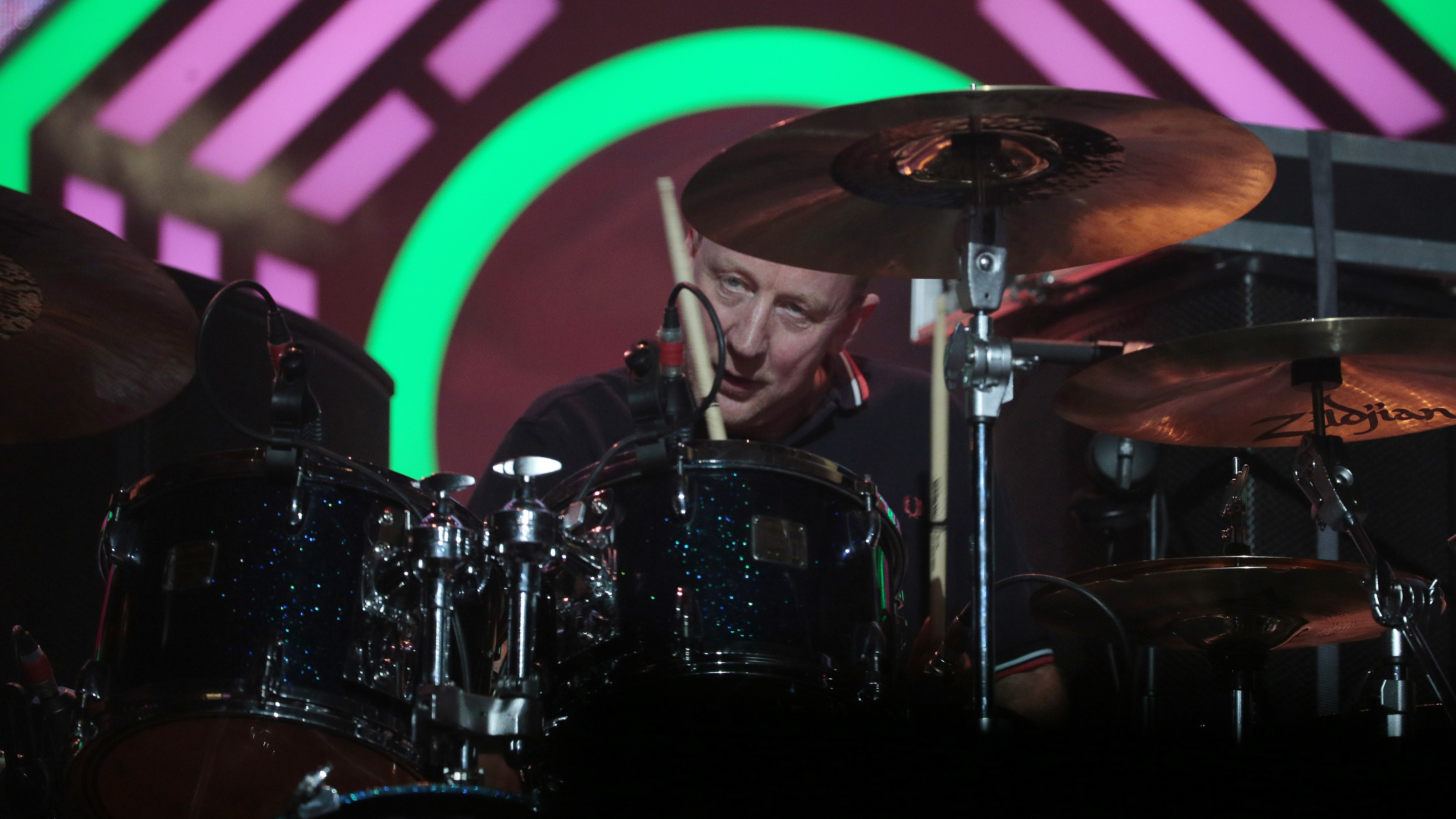
And speaking of interesting, challenging and exciting… Blur. Wembley Stadium, July 2023?
"Any time is a great time to get Blur back together. And who could say no when offered Wembley Stadium to play at? It's one of the few landmark places we haven't played, and I'm excited and humbled by how big the appetite for the show has turned out to be."
Blur Vs Oasis. From the inside. Did you want to win? Did it matter?
"It definitely seemed to at the time. But in the grand scheme of things we were both winners really, weren’t we? It propelled us both to the next level, but it also meant that we were joined at the hip."
Are you on speaking terms?
"Oh yeah, that was all a long time ago. That was the 1990s! Remember them?"
Daniel Griffiths is a veteran journalist who has worked on some of the biggest entertainment, tech and home brands in the world. He's interviewed countless big names, and covered countless new releases in the fields of music, videogames, movies, tech, gadgets, home improvement, self build, interiors and garden design. He’s the ex-Editor of Future Music and ex-Group Editor-in-Chief of Electronic Musician, Guitarist, Guitar World, Computer Music and more. He renovates property and writes for MusicRadar.com.
